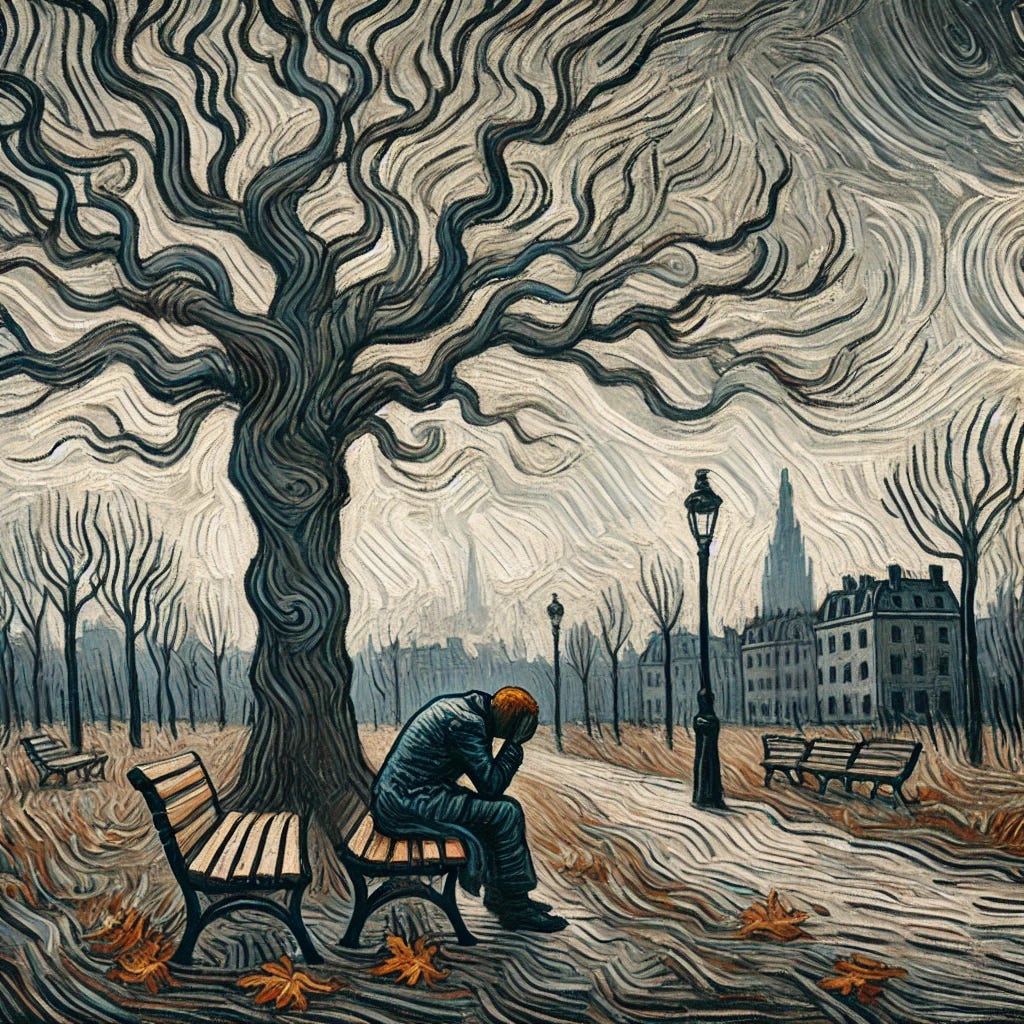Navigating Change: Mastery Through Grief (Part 3)
You may ask yourself; How did I get here? How do I manage this?
This post is the third in a four-part series titled “AI, Education, and The Five Stages of Grief.” If you’re catching up, you can find the first installment here and the second here. Additionally, this post was written with assistance from a Large Language Model.
Close your eyes—figuratively, that is. I know you can’t read with your eyes closed. What I mean is, open your imagination.
Imagine a time when you felt overwhelmingly behind. In this moment, the temptation to give up was strong, but instead, you decided to press on. Envision yourself in a race, head down, in a determined sprint. Your arms pump, your legs push hard, and you're solely focused on catching up, not paying any mind to your surroundings.
As you reach "the zone," that state where action flows without thought, you feel energized, though unaware of your position. Then, one moment, you look up and, almost as if by divine intervention, you find yourself leading the pack. You've not just caught up; you're setting the pace.
You allow yourself to slow, to take in the view, to jog lightly.
It's a surreal feeling, isn't it? Slightly confusing, too. A bit like what David Byrne sang in 'Once in a Lifetime': 'This is not my beautiful house. This is not my beautiful wife... How did I get here?'
Change Agents
You've become what's known as a "change agent." Perhaps you're a Principal adapting to the integration of AI, or a leader crafting system-wide policies. Maybe you're a proactive teacher encouraging your peers to embrace new methodologies.
In the context of the Five Stages of Grief, you are at the stage of acceptance, looking back at colleagues who are still navigating the earlier stages—denial, anger, bargaining, and depression.
As you adjust to this role, it might feel disorienting, once again reminiscent of David Byrne's words: "You may ask yourself; how do I work this?"
Emotions as Energy
One strategy for managing change through the Five Stages of Grief is to re-frame the first four emotions as tools that can be leveraged to accelerate the process of reaching acceptance. Too often, I think, we view negative emotions as things to suppress, deny, avoid, or even stigmatize.
However, we can reframe this negativity by first acknowledging an important fact: emotions are a form of energy. Take it a step further by considering Sir Isaac Newton's First Law of Thermodynamics, which states that energy cannot be created or destroyed, only transformed. Therefore, we should not aim to eliminate or destroy the energy associated with the first four stages of grief, but rather transform it into positive energy that can fuel our journey from resistance to acceptance.
Said differently, the energies associated with these emotions aren’t going anywhere, so we might as well use them for good.
Throughout this piece, italicized text will reflect the voice of a change agent—be it an innovative teacher, an adaptable administrator, or a workshop presenter—guiding a colleague, friend, or audience member who is yet to move beyond an initial stage of grief by helping them transform the negative emotion into a positive one for change. This narrative shift invites you, the reader, to engage your imagination and explore these perspectives from that standpoint.
Denial
Recognizing one's own denial is notoriously difficult. The term itself implies a refusal to acknowledge reality. This recognition requires what we might call metacognitive honesty—a deep, reflective self-awareness that most of us find challenging to gather.
We can help people build that type of reflective honesty through the creation of distance between the subject and their emotion. Distance will allow them to view the situation more objectively and honestly.
To help foster this honesty, we can use imaginative exercises that put our subject on the “other side” of the issue, as if they are coaching someone else through the same problem. This empowerment allows a person to reflect more honestly on their own situation.
Change Agent: Imagine, for a moment, you are not an educator but a coach observing a player who refuses to adapt to a new strategy. You give the same feedback every day, but the player refuses to budge. They like doing it their way, even though their results are declining consistently with no signs of stopping.
For their sake, you wish they would snap out of it. But you know you can’t do much for them. They have to reach that conclusion on their own. After all, “the worst things we can do for our loved ones are the best things they can – and should – do for themselves.”
Now, return to the present. As an educator in 2024, confronting the integration of artificial intelligence, you face similar challenges. The educational landscape is shifting, and clinging to outdated methods will only hold you back. Just as you would want your hypothetical player to embrace new strategies for their benefit, you must do the same.
As I hope you can see here, our imaginations are powerful. Sending ourselves into another world is the first step in developing metacognitive honesty. If you see a friend, colleague, or loved one struggling to do the same – work on their imagination.
Anger
Anger is often seen as a negative emotion, one that can lead to violence and/or paralysis if not managed properly. Yet, as Malcolm X famously stated, "Usually when people are sad, they don't do anything. They just cry over their condition. But when they get angry, they bring about a change.”
This perspective is vital in contexts where anger, rather than inciting violence or destructive behavior, serves as a major catalyst for action.
Like other painful emotions, anger can be recalibrated, reshaped, or redirected towards forging positive change. It is about transforming this fiery energy into a force that propels us forward, not one that anchors us in frustration.
Change Agent: Let's address the elephant in the room. How many of you are frustrated with the rapid changes brought about by AI? How many feel overwhelmed by the pace, perhaps even angry that it's hard to keep up?"
You're not alone in feeling this way, and frankly, it's understandable. It's okay to be angry. I am, too, at times. Why the rush, tech companies? Why not allow us time to adapt?
But here's the crucial point—our anger can be the spark that motivates us to engage more deeply with these changes, to not just passively accept but actively shape the future of our professions. We mustn't let our anger hold us down; instead, let it galvanize us.
If you are or ever have been an athletics coach, you will recognize this motivating tactic immediately. Sometimes, athletes just need to get mad. Anger is not always a bad thing, as long as we leverage it in moderation.
Bargaining
Leveraging emotion to get “through” the bargaining stage requires calling on a person’s pride. Pride and anger are cousins, so this section will feel a lot like the previous one.
Change Agent: Think about it: Are you really content letting others dictate the terms of your future? Your role in this changing landscape is much larger than you might believe. We often find ourselves bargaining when we feel powerless, trying to salvage whatever control we think we have left.
The reality is, our control—our locus of control—is often greater than we perceive. The sense of powerlessness that drives us to bargain is often a misconception. We're not just scrabbling for scraps; we have more of an ability to assert our needs and shape outcomes than we realize.
Change Agent: You have a significant say in how AI is integrated into our educational systems. If you don't raise your voice, if you remain on the sidelines, decisions will be made without your input. The result? Solutions that may not align with our needs or might outright ignore them.
Recognizing that you can influence how technology affects your profession is empowering. This realization shifts the bargaining from a position of weakness to one of strength. It's not just about having a seat at the table; it's about actively engaging in the game, knowing the rules, and making informed moves.
Passing through the “bargaining” stage of the Five Stages of Grief involves igniting their pride. From there, your subject should be motivated to strengthen their position even more by being thoughtful, proactive, and engaged.
Depression
Kick-starting action from the depression stage requires using the same type of imaginative approach we used for our friend in denial. We can put our subject on the “other side” of the emotion — coaching someone else they know and love. We also need to let the subject know they are not alone.
Change Agent: Many of us have supported friends or family through bouts of depression. It's tough, watching someone you care about struggle, feeling somewhat powerless to help. I've felt this too, particularly with the rapid changes in education due to AI technology. Even experts occasionally lose sleep over the challenges we face.
In addressing depression, unlike anger or bargaining which might harness one’s ego, we lean on empathy and compassion. We do it by showing we care. We encourage those suffering to engage in simple, manageable activities as a starting point for recovery.
Change Agent: How do we help those we care about who are depressed? We start by showing empathy. Then, we suggest small, manageable steps. 'Take a walk,' we advise. 'Get some fresh air.' Often, just a bit of activity and a change of scenery can begin to shift one’s mood and outlook.
In the context of adapting to AI in education, "taking a walk" translates to manageable actions that are exploratory but not necessarily intimidating. This could mean participating in a webinar, experimenting with a large language model, or reading introductory materials on AI. The specifics aren’t crucial—what matters is the act of engaging, which can help break the inertia of depression.
Continue the hypothetical scenario by allowing your subject to coach their friend or loved one out of their so-called “funk.” Then, frame the process of engaging in that same action for oneself as a “gift.”
Change Agent: Imagine helping a friend lace up their shoes for a walk to clear their mind. Now think about doing the same for yourself. It’s not about making monumental changes all at once, but rather allowing yourself the space to gradually adapt and find comfort in new routines.
This approach helps individuals in the depression stage to see their potential actions as empowering and self-affirming, turning the journey through grief into a proactive path toward acceptance and transformation.
Conclusion + Acceptance
I hope this concept of “flipping” our negative emotions into powerful ones resonates with you. My goal is to provide frameworks for change agents across the spectrum of education to help our industry move forward. Either way, I’d love to hear your feedback and experiences with this process. It’s a complicated one.
In that vein, the final post in this series will focus on the acceptance stage, which might seem at first glance to be straightforward but actually encompasses quite a bit of nuance.
I look forward to seeing you there.







Hey wise one. This one is deep. I remember the first time you engaged me in conversation - it was about my emotions - something like the other side of fear is excitement. There's a lot to experience here and I hope you get to do lots of in-person workshops on taking educators and business folks through this.
Hi Mike...this was a thought provoking post. It reminded me of Bridges Transition Model, but with more meat. It also reinforces the notion that resistance to change is the fear of loss. Which leads me to a question - In your opinion, what role does the "lizard brain" play in this process?